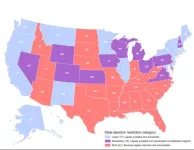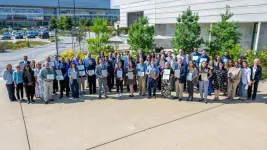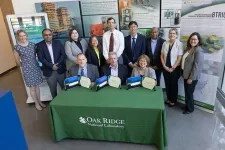(Press-News.org) One of the most critical safety concerns for electric vehicles is keeping their batteries cool, as temperature spikes can lead to dangerous consequences.
New research led by a University of Arizona doctoral student proposes a way to predict and prevent temperature spikes in the lithium-ion batteries commonly used to power such vehicles.
The paper "Advancing Battery Safety," led by College of Engineering doctoral student Basab Goswami, is published in the Journal of Power Sources.
With the support of $599,808 from the Department of Defense's Defense Established Program to Stimulate Competitive Research, Goswami and his adviser, aerospace and mechanical engineering professor and project principal investigator Vitaliy Yurkiv, developed a framework that uses multiphysics and machine learning models to sense, predict and identify lithium-ion battery overheating, known as thermal runaway.
In the future, this framework could be integrated into an electric vehicle's battery management system to stop a battery from overheating, thereby protecting drivers and passengers, Goswami said.
"We need to move to green energy," Goswami said, "but there are safety concerns associated with lithium-ion batteries."
Using the past to predict the future
Thermal runaway can be extremely dangerous and difficult to predict.
"The temperature in a battery will escalate in an exponential manner and it will cause fire," Goswami said.
An electric vehicle battery pack is comprised of closely connected battery "cells." Today's electric vehicles can have more than 1,000 cells in each battery pack.
If thermal runaway occurs in one cell, nearby cells are highly likely to heat, too, creating a domino effect. If that happens, the entire battery pack of the electric vehicle could explode, Goswami said.
To prevent this, the researchers propose using thermal sensors – wrapped around battery cells – that feed historical temperature data into a machine learning algorithm to predict future temperatures. The algorithm predicts when and where a runaway event is likely to start.
"If we know the location of the hotspot (the beginning of thermal runaway), we can have some solutions to stop the battery before it reaches that critical stage," Goswami said.
Yurkiv said he was impressed by the accuracy of Goswami's algorithm. Prior to his research, machine learning models had not been used to predict thermal runaway.
"We didn't expect that machine learning would be so superior to predict thermocouple temperature and location of hotspots so precisely," Yurkiv said. "No human would ever be able to do that."
The research builds on a paper Goswami and Yurkiv published in January investigating the use of thermal imaging to predict runaway, which would require heavy imaging equipment constantly taking photos for review.
The solution Goswami and Yurkiv identify in their latest paper is lighter and more cost-effective.
Meeting a global demand
Goswami's research was published at an important point in American car manufacturing history. In July, the same month the paper was published, the Biden administration announced a $1.7 billion investment in electric vehicle manufacturing across eight states. In 2023, global electric vehicle sales increased 35% from 2022.
As demand rises, safety measures are essential to the electric vehicle movement, Goswami said.
"Many people are still hesitant to embrace batteries due to various safety concerns," he said. "To gain widespread acceptance, it's crucial for the public to know that ongoing research is actively addressing these critical safety issues."
END
Preventing car battery fires with help from machine learning
Basab Goswami's framework sets the stage for car manufacturers to more accurately predict and prevent dangerous EV battery fires with machine learning.
2024-09-04
ELSE PRESS RELEASES FROM THIS DATE:
Heavy metal cadmium may be tied to memory issues for some
2024-09-04
MINNEAPOLIS – The heavy metal cadmium, which is found in the air, water, food and soil, is known to cause health problems. A new study published in the September 4, 2024, online issue of Neurology®, the medical journal of the American Academy of Neurology, examined if thinking and memory skills were associated with cadmium exposure. They found no association when they looked at the group as a whole. However, when looking at Black and white people separately, it found cadmium may be tied to problems with thinking and memory skills in white people. ...
Strictest abortion-ban states offer least family support
2024-09-04
View a breakdown of the abortion restrictions by state below
States with early abortion bans are less likely to offer paid time off after childbearing, to give poor children nutritional support or to expand access to reproductive health care
Marginalized people and those with low socioeconomic status are overrepresented in ban states and least likely to overcome the barriers that bans impose
CHICAGO --- States with the most severe post-Dobbs abortion restrictions also have the fewest policies in place to support raising families, reports a new Northwestern Medicine study.
“We found that in the states that most severely ...
Study: People facing life-or-death choice put too much trust in AI
2024-09-04
In simulated life-or-death decisions, about two-thirds of people in a UC Merced study allowed a robot to change their minds when it disagreed with them -- an alarming display of excessive trust in artificial intelligence, researchers said.
Human subjects allowed robots to sway their judgment despite being told the AI machines had limited capabilities and were giving advice that could be wrong. In reality, the advice was random.
“As a society, with AI accelerating so quickly, we need to be concerned about the potential for overtrust,” said Professor Colin ...
Leaders of ‘EV Ready’ Illinois cities recognized in ceremony at Argonne
2024-09-04
City leaders who are working to accommodate more electric vehicles (EVs) were recognized in a ceremony o Aug. 23 at the U.S. Department of Energy’s (DOE) Argonne National Laboratory. Utility ComEd and the Metropolitan Mayors Caucus spotlighted 12 communities in northern Illinois that recently completed the EV Readiness Program.
The EV Readiness Program trains and assists local government officials in taking concrete steps to support EV adoption. As a national leader in EV research, ...
Survey shows nearly 70% of US hospitals affiliated with medical schools host a fast-food restaurant; Chick-fil-A, McDonald’s among most common
2024-09-04
WASHINGTON, D.C.—A new survey by the Physicians Committee for Responsible Medicine published in the American Journal of Lifestyle Medicine reveals that 69.2% of U.S. hospitals affiliated with a medical school host at least one fast-food restaurant. The five most common fast-food restaurants located in hospitals were Starbucks, Subway, Chick-fil-A, Au Bon Pain, and McDonald’s.
“Making fast food like cheeseburgers and fried chicken available in hospitals is hazardous to the health of patients, visitors, and staff,” says Zeeshan Ali, PhD, the lead author of the paper and a nutrition program specialist with the Physicians Committee. “Hospitals ...
Study solves testosterone’s paradoxical effects in prostate cancer
2024-09-04
DURHAM, N.C. – A treatment paradox has recently come to light in prostate cancer: Blocking testosterone production halts tumor growth in early disease, while elevating the hormone can delay disease progression in patients whose disease has advanced.
The inability to understand how different levels of the same hormone can drive different effects in prostate tumors has been an impediment to the development of new therapeutics that exploit this biology.
Now, a Duke Cancer Institute-led study, performed ...
New UMass study shows that ‘super spikes’ can increase track running speed by 2%
2024-09-04
New research published in the Journal of Sport and Health Science led by the University of Massachusetts Amherst shows that super spikes, scientifically described as advanced footwear technology (AFT) spikes, can give runners about a 2% edge in middle-distance track races, like the 800- and 1,500-meters.
“Track athletes started wearing super spikes about five years ago and they are now commonplace in elite track races,” says Wouter Hoogkamer, assistant professor of kinesiology at UMass Amherst and senior author ...
Department of Energy announces $118 million for Energy Frontier Research Centers
2024-09-04
WASHINGTON, D.C. -Ten Energy Frontier Research Centers (EFRCs) designed to bring together world-class teams of scientists for groundbreaking fundamental research have been funded in nine states by the U.S. Department of Energy (DOE).
Since 2009, EFRCs have brought together diverse, world-class teams of scientists to perform basic research that accelerates ground-breaking scientific advances underlying energy technologies.
The centers develop powerful new tools for characterizing, understanding, modeling, and manipulating matter, while training the next-generation scientific workforce by attracting talented students passionate about energy science.
“Fundamental ...
ACC Quality Summit highlights critical value of ACC accreditation and NCDR services
2024-09-04
The American College of Cardiology (ACC) Quality Summit 2024 will take place on September 17-19 in San Antonio, bringing together cardiovascular leaders from across the nation to discuss the value of NCDR services and quality programs.
“ACC’s Quality Summit puts the spotlight on the value of ACC Accreditation and NCDR services for improving health care quality across all health systems,” said ACC Quality Summit Chair Olivia N. Gilbert, MD, MSc, FACC, and Director of Quality and Value for Cardiovascular Medicine at Atrium Health Wake Forest ...
Coatings manufacturer and ORNL partner Flexcon licenses self-healing film technology
2024-09-04
Flexcon Global has exclusively licensed two patented inventions to manufacture a self-healing barrier film from the Department of Energy’s Oak Ridge National Laboratory for research and development purposes. The film can be incorporated into vacuum insulation panels to increase the efficiency of buildings during retrofits.
Flexcon, based in Spencer, Massachusetts, provides coatings, film laminations and functional technologies to a range of markets including healthcare, sustainable packaging, transportation, consumer durables, electronics, industrial, retail and advertising.
Under ...
LAST 30 PRESS RELEASES:
Microalgae-derived biochar enables fast, low-cost detection of hydrogen peroxide
Researchers highlight promise of biochar composites for sustainable 3D printing
Machine learning helps design low-cost biochar to fight phosphorus pollution in lakes
Urine tests confirm alcohol consumption in wild African chimpanzees
Barshop Institute to receive up to $38 million from ARPA-H, anchoring UT San Antonio as a national leader in aging and healthy longevity science
Anion-cation synergistic additives solve the "performance triangle" problem in zinc-iodine batteries
Ancient diets reveal surprising survival strategies in prehistoric Poland
Pre-pregnancy parental overweight/obesity linked to next generation’s heightened fatty liver disease risk
Obstructive sleep apnoea may cost UK + US economies billions in lost productivity
Guidelines set new playbook for pediatric clinical trial reporting
Adolescent cannabis use may follow the same pattern as alcohol use
Lifespan-extending treatments increase variation in age at time of death
From ancient myths to ‘Indo-manga’: Artists in the Global South are reframing the comic
Putting some ‘muscle’ into material design
House fires release harmful compounds into the air
Novel structural insights into Phytophthora effectors challenge long-held assumptions in plant pathology
Q&A: Researchers discuss potential solutions for the feedback loop affecting scientific publishing
A new ecological model highlights how fluctuating environments push microbes to work together
Chapman University researcher warns of structural risks at Grand Renaissance Dam putting property and lives in danger
Courtship is complicated, even in fruit flies
Columbia announces ARPA-H contract to advance science of healthy aging
New NYUAD study reveals hidden stress facing coral reef fish in the Arabian Gulf
36 months later: Distance learning in the wake of COVID-19
Blaming beavers for flood damage is bad policy and bad science, Concordia research shows
The new ‘forever’ contaminant? SFU study raises alarm on marine fiberglass pollution
Shorter early-life telomere length as a predictor of survival
Why do female caribou have antlers?
How studying yeast in the gut could lead to new, better drugs
Chemists thought phosphorus had shown all its cards. It surprised them with a new move
A feedback loop of rising submissions and overburdened peer reviewers threatens the peer review system of the scientific literature
[Press-News.org] Preventing car battery fires with help from machine learningBasab Goswami's framework sets the stage for car manufacturers to more accurately predict and prevent dangerous EV battery fires with machine learning.






